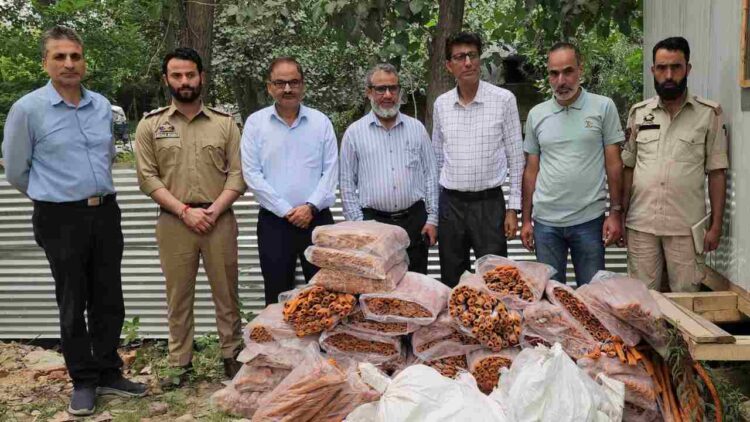Srinagar, Sept 20: Several meat samples seized during a recent crackdown in Kashmir have been declared unfit for human consumption, with official laboratory reports confirming the presence of banned and carcinogenic additives.
According to test results from the National Food Laboratory Ghaziabad and FICCI Research and Analysis Centre, New Delhi, a copy of which lies with ANH, states that harmful synthetic colours such as carmoisine, tartrazine, and erythrosine were detected in the seized meat. These additives are banned in meat products due to their cancer-causing potential.
The National Meat Research Institute, Hyderabad, further revealed that carabeef (buffalo meat) was being sold in Srinagar markets without proper declaration or regulation.
Elected Govt Won’t Quit, Will Fight for Statehood, People’s Rights: Dy CM Choudhary
Crackdown and Findings
In the first phase of inspections, authorities collected 57 samples from 11 districts. Out of 18 samples tested so far, four were declared unsafe, two met quality standards, and the rest are under analysis. Srinagar alone accounted for 18 samples, two of which failed quality checks.
Inspection records show that 834 raids were carried out across 13 districts. Nearly 1,700 kilograms of meat, chicken, fish, and paneer were seized, while more than 11,000 kilograms of spoiled food items—including momos—were destroyed. Srinagar witnessed the largest single seizure of about 1,400 kg of meat-related products.
Legal Action and Suspensions
Police have filed multiple FIRs against traders and suppliers across Kashmir. So far, 27 cases have been presented before adjudicating officers, with courts imposing fines exceeding ₹87 lakh.
The licences of nine food business operators have been suspended following confirmed violations. Those named include Al-Taqwa Foods, Aarif Enterprises, Sunshine Foods, Anmol Foods, and Jubilant Food Works Ltd. (Domino’s Pizza, Anantnag), along with several other eateries and suppliers in Srinagar and Anantnag districts.
Public Concerns
The revelations have raised alarm among consumers. “In villages, there are no slaughterhouses. People don’t even know what they are eating in the name of meat,” said Mohammad Yousuf, a farmer from Budgam. Bilal Ahmad, a butcher from Anantnag, added: “If officials inspect only once in six months, the entire supply chain adjusts. Regular checks are the only way to ensure safe food.”
Enforcement Challenges
To step up enforcement, the Food and Drug Administration (FDA) has sought 10 additional mobile testing labs under the Food Safety on Wheels programme. The department has also requested approval for permanent labs in Anantnag and Kathua-Samba for better regional coverage.
However, officials admit that manpower shortages and infrastructure gaps remain a hurdle, with dozens of posts—including food safety officers—lying vacant across the Union Territory.
Last month, Chief Minister Omar Abdullah chaired a high-level meeting on the issue, but systemic constraints continue to limit the department’s ability to enforce food safety laws effectively.
















